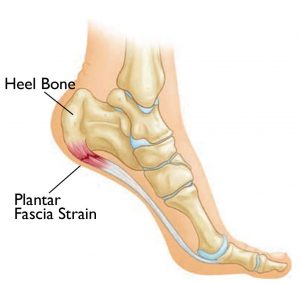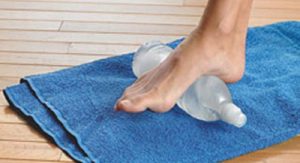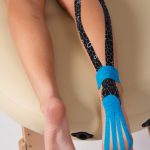 You may have heard of it; you may have suffered from it. Plantar Fasciitis (PLAN-tur fas-e-I-tis) is a very common condition defined by an inflammation of the tissues that run along the bottom of the foot, connecting the heel to the toes. Pain is typically felt in the front part of the heel and arch of the foot. The pain is common when rising in the morning or after long bouts of inactivity. It can also strike as a result of long periods of standing or following exercise, making it a common complaint of runners and other athletes.
You may have heard of it; you may have suffered from it. Plantar Fasciitis (PLAN-tur fas-e-I-tis) is a very common condition defined by an inflammation of the tissues that run along the bottom of the foot, connecting the heel to the toes. Pain is typically felt in the front part of the heel and arch of the foot. The pain is common when rising in the morning or after long bouts of inactivity. It can also strike as a result of long periods of standing or following exercise, making it a common complaint of runners and other athletes.
Our bodies naturally try to avoid pain so without realizing it you may be changing your running style, working stance, or walking gait. This can result in strain to other body parts like your knees, back, or other parts of your foot. Continued trauma to the plantar fascia can also cause heel spurs, tiny calcium deposits that develop on the heel bone. If the condition has progressed to heel spurs, you will likely feel the pain of the calcium deposits stabbing into the padding of your heel. There are also ways to prevent Plantar Fasciitis and especially the continuation of the problem into heel spurs. Wherever you’re at in your relationship with Plantar Fasciitis, an experienced physical therapist can help alleviate the problem. Here are some quick pointers to get you started.
Home Care
Rest is a critical part of the solution. Avoid standing for long periods whenever possible and give your feet frequent breaks regardless of your activity level.
Maintaining a healthy weight benefits your entire body, including your hardworking feet. While rest and losing weight don’t always go hand in hand, try taking up a low impact option like water aerobics or yoga to stay active sans the impact of running or walking.
Exercising or not, invest in supportive shoes for your type of foot. High arches and flat feet are particularly susceptible to irritation. Make sure your footwear has a thick, cushioned sole and good heel support. Also check into orthotic inserts that can provide the right support and cushion to aid in optimal foot health as well as body alignment. Use over the counter pain relievers to reduce both pain and inflammation.
 Ice will also help reduce the inflammation, but note that Plantar Fasciitis can take six months to one year of recovery time. Use a wrap made specifically for holding the ice in the right position while offering a protective layer between the ice and your skin. You can use a frozen bag of peas wrapped in a thin towel for the same effect. Alternately, place your heels into a tray of ice water, keeping your toes above the water level.
Ice will also help reduce the inflammation, but note that Plantar Fasciitis can take six months to one year of recovery time. Use a wrap made specifically for holding the ice in the right position while offering a protective layer between the ice and your skin. You can use a frozen bag of peas wrapped in a thin towel for the same effect. Alternately, place your heels into a tray of ice water, keeping your toes above the water level.
How Physical Therapy Can Help Plantar Fasciitis
Early intervention is the key to a quicker and more complete recovery. If you are having early symptoms of heel or arch pain make and appointment right away and start working towards a solution.
 Your physical therapist will evaluate your condition and recommend exercises to alleviate the inflammation and aid in recovery before the condition worsens. Exercises will likely include stretches that target mobility for your calves, Achilles tendon, and the bottom of your foot. The focus will equally target strengthening the lower leg and foot muscles that provide support. Your PT may also use athletic tape and offer shoe inserts to change support. Likely, treatment will also include exercises that focus on your body alignment.
Your physical therapist will evaluate your condition and recommend exercises to alleviate the inflammation and aid in recovery before the condition worsens. Exercises will likely include stretches that target mobility for your calves, Achilles tendon, and the bottom of your foot. The focus will equally target strengthening the lower leg and foot muscles that provide support. Your PT may also use athletic tape and offer shoe inserts to change support. Likely, treatment will also include exercises that focus on your body alignment. 
Although Plantar Fasciitis is a common condition, each person’s situation is different so it’s important to be evaluated by a medical professional who can set you on the right path towards recovery. Call Encore Physical Therapy today to see how we can help.